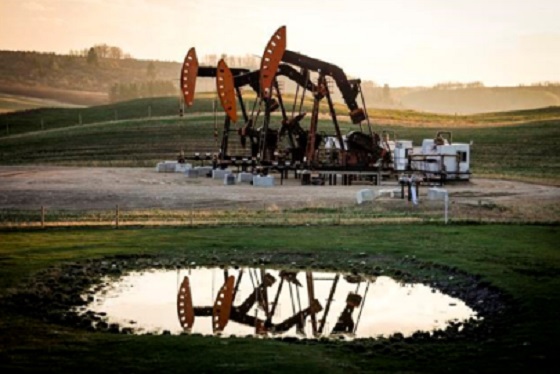Energy
The Next Canadian Federal Election Will Also be a Crucial Energy Issues Election

From EnergyNow.ca
By Maureen McCall
Since January 6, 2025, when Prime Minister Trudeau announced that he was stepping down as Prime Minister of Canada and announced that the Governor General had granted his request to prorogue Parliament, Canadians have been contemplating the fallout.
Terry Winnitoy, co-founder of EnergyNow.ca in Canada and EnergyNow.com in the US, wisely chose to bring together speakers from provincial and federal governments, as well as energy industry SMEs and an indigenous organization to discuss energy issues that will be part of this year’s 2025 federal election in Canada and crucial to Canada’s energy future; The Federal ‘Energy’ Election ’25 event was held at the Calgary Petroleum Club last week to a packed room.

The Federal ‘Energy’ Election ’25 Panel – From Left to Right : Greg McLean, David Yager, Rebecca Schulz, Kendall Dilling and Dale Swampy
Tracey Bodnarchuk CEO of Canada Powered By Women moderated the leaders’ panel which included Greg McLean Calgary Centre Federal Conservative MP, Rebecca Schulz Alberta Minister of Environment and Protected Areas, David Yager Senior Advisor to Alberta Premier Danielle Smith, Energy industry Entrepreneur and Author, Kendall Dilling, Pathways Alliance President and previous Cenovus Energy Vice-President- Environment & Regulatory, and Dale Swampy, President and founder of the National Coalition of Chiefs who is a board member and provides advisory services to The Canadian Energy Regulator (CER) and the Business Council of Alberta.
The discussion focused on the critical importance of the upcoming federal election, emphasizing the need for pragmatic, common-sense policies that will shape energy policies for decades to come.
Some of the Key points made by the panel included Canada’s significant role as the fourth-largest oil producer and fifth-largest natural gas producer, contributing 10% to GDP and $200 billion in exports. MP Greg McLean commented on how dramatically MPs in Ottawa have done a 180-degree pivot from their anti-fossil fuel stance of the last ten years.
“What I find ironic is the fact that you’ve got many eastern politicians- federal and provincial that are saying we need to use the oil industry as our trump card, and no pun intended,” McLean said.
“They’re actually trying to say this energy is very important. I can’t tell you how many years and how many speeches I’ve heard in the House of Commons about how we need to do away with this (Oil and Gas) industry as quickly as possible.
A wake-up call has happened. Now we recognize how important this industry is, as far as a job contributor, an economic contributor, and a taxation contributor to the Canadian economy. Now suddenly it’s the most important industry in Canada.”
The panel discussion highlighted the broad impacts of Trump tariffs and the need for pragmatic, common-sense policies that will shape energy policies for decades.
Minister Rebecca Schulz echoed the recent changes in energy discussions.
“Now we have to focus on energy security, affordability, our economy, jobs for everyday people, Schulz said. “We have to talk about that more now than we had in the past – when our federal government only wanted to talk about the environment and emissions. That is not a reasonable, rational conversation now, and it’s not what Canadians want to hear right now.”
She commented that the federal government has been problematic over the 10 years and said it was Premier Danielle Smith’s strong communications, advocacy and presence in the US and across North America – reaching out to policymakers south of the border that contributed to a reprieve in tariffs.
Dave Yager briefly described the market conditions that enabled misguided Federal govt policies over the last ten years.
“There were a lot of trends that took place from 2015 to 2019,” Yager said. “Interest rates were really low. Inflation was really low. They kept up with quantitative easing. The governments looked invincible. Renewables appeared to be penetrating because the cost was buried, and they never really realized what a contribution the collapse of oil prices made in 2015 to keep inflation down.
Why quantitative easing wasn’t inflationary until 2020 had a lot to do with the low price of oil and the low price of natural gas. That’s all changed. It started in 2020 and by 2022 when the Russian tanks went into Ukraine, all of a sudden we’ve got a whole different world. If you look around the world, a lot of people have changed direction. So I think there’s a growing realization that the platform that this government was elected on just doesn’t exist anymore.”
Kendall Dilling added his agreement that we are at “a palpable inflection point”. He saw a silver lining to all the challenges that he views as a wake-up call for Canadians.
“The question is, can we capitalize on it,” Dilling said. “and actually bring some change to fruition before we slide back into complacency?
When we talk about how we respond, there’s no scenario where we don’t remain intrinsically linked to the United States from a supply chain and energy perspective.
But we have become codependent. We slacked on our NATO and border commitments and other things. We’ve decided that only one issue mattered for the last decade, at the expense of the economy and we find ourselves in an unenviable position. Now the opportunity is in front of us to get a national consensus on the importance of the economy and actually drive some change.”
Dale Swampy stated that the Tariff issue has real relevance for the First Nations that the NCC represents as most of those Nations are located in Alberta and fully entrenched in the oil and gas industry.
He sees the importance of the impact on Canada and the U.S. as a driver for diversification to find new markets and he has experience in the fight to get pipeline project approval under the current processes. In 2010, he joined the Indigenous Relations team for the Northern Gateway Pipeline Project as Director of Indigenous Relations for the BC terrestrial region.
He worked with Indigenous community leaders to establish the Northern Gateway Aboriginal Equity Partners group or AEP – a group comprised of 31 Aboriginal community leaders working as part of an unprecedented partnership with Northern Gateway. It was after the cancellation of the project in 2016 that he started the National Coalition of Chiefs (NCC).
“I think it’s more important to understand that we have an opportunity now. It’s been nine years since they cancelled the Northern Gateway project. It’s been nine years since we have had an opportunity like this and can put the idea of building Northern Gateway and Energy East back on the table.
We want to advocate for the possibility of getting Northern Gateway launched again. If we get a First Nation-led project, we will support it. Now we have some leverage and we do have the ability to build it. So we’re working with a lot of the big six oil sands companies to say that we’ll put our name onto this and promote the Northern Gateway project.”
Swampy noted that with regulatory refinements, the pipeline could be built in a much more effective timeline than TMX.
The panel discussed specific projects like LNG expansion and the potential for more First Nations-led initiatives underscoring the urgency of rebuilding trust and attracting international capital to drive economic growth.
The discussion highlighted the challenges faced by Canada’s resource-based industries due to investor impatience with investors preferring more predictable returns, and favouring projects in the US (which are approved and built in much shorter timelines) over Canadian projects like LNG which become mired in regulatory red tape.
The comparison was made that Canada has only two LNG projects under construction compared to the US’s 25 billion cubic feet a day since 2015.
The panel addressed the current political instability with a parliament shutdown and a looming election. They emphasized the need for balanced policies that consider economic growth, energy security, and environmental responsibility but also shorten the overwrought regulatory process to get projects approved and built. They called for better communication and advocacy, particularly through social media, to influence public perception and policy.
MP Greg McLean summed up much of the sentiments of the panel saying:
“Oil is still going to be oil. Getting Canadian oil consumed in Canada, and getting a pipeline all the way through to New Brunswick makes all the sense in the world. Finally, the politicians are there. So maybe one of the things that we’ve seen in the last while about what the president of the United States has put on our table is the opportunity to cooperate to get the Canadian economy working coast to coast.”
Maureen McCall is an energy professional and Senior Fellow at the Frontier Center For Public Policy who writes on issues affecting the energy industry.
Business
Canada should already be an economic superpower. Why is Canada not doing better?

From Resource Works
Tej Parikh of the Financial Times‘s says Canada has the minerals but not the plan
Tej Parikh is the economics editorial writer for The Financial Times, a British daily newspaper. He joins our Stewart Muir for a Power Struggle interview. And we include in the following report some points from a guest column by Parikh in Canada’s National Post, which carried the headline ‘How Canada can unlock its economic superpower potential.’
Parikh begins the Power Struggle interview with this: “There’s an enormous economic potential here, very much the same geographic advantages that have underpinned America’s economic emergence over the last 100 years. . . . Given everything we understand about the advantages that countries need to grow, why is Canada not doing better economically?” He added: “When you break it down and you look at why income per capita in Canada has perhaps not increased as fast as we might expect on the basis of those advantages, it really kind of breaks down to three components. One is investment, so how much capital goes into the country?
The second is labour, and not just the amount, the size of the workforce you have, but how well you utilize the workforce. And then the third component is something that economists like to call a total-factor productivity, which is essentially your innovative ability and your ability to bring together capital and people. “And when you look at Canada as opposed to other large economies . . . you begin to see that actually there are a lot of restrictions in Canada, not just because of its vast geography but because of regulation, that it actually can’t combine its capital and labour as productively as it could.
“It’s about creating those supply chains and critical minerals that the Western world is currently short of. Given it (Canada) has these vast raw material resources, there is a massive scope for it to become even more integrated into Western supply chains in particular and to become a supplier of these things.” From Parikh’s National Post column: “The country is energy independent, with the world’s largest deposits of high-grade uranium and the third-largest proven oil reserves. It is also the fifth-largest producer of natural gas.Canada boasts a huge supply of other commodities too, including the largest potash reserves (used to make fertilizer), over one-third of the world’s certified forests and a fifth of the planet’s surface freshwater. Plus, it has an abundance of cobalt, graphite, lithium and other rare earth elements, which are used in renewable technologies. “But the nation has lacked the visionary leadership and policy framework to capitalize on its advantages.”
Watch the full interview here:
Energy
Carney’s Bill C-5 will likely make things worse—not better

From the Fraser Institute
By Niels Veldhuis and Jason Clemens
The Carney government’s signature legislation in its first post-election session of Parliament—Bill C-5, known as the Building Canada Act—recently passed the Senate for final approval, and is now law. It gives the government unprecedented powers and will likely make Canada even less attractive to investment than it is now, making a bad situation even worse.
Over the past 10 years, Canada has increasingly become known as a country that is un-investable, where it’s nearly impossible to get large and important projects, from pipelines to mines, approved. Even simple single-site redevelopment projects can take a decade to receive rezoning approval. It’s one of the primary reasons why Canada has experienced a mass exodus of investment capital, some $387 billion from 2015 to 2023. And from 2014 to 2023, the latest year of comparable data, investment per worker (excluding residential construction and adjusted for inflation) dropped by 19.3 per cent, from $20,310 to $16,386 (in 2017 dollars).
In theory, Bill C-5 will help speed up the approval process for projects deemed to be in the “national interest.” But the cabinet (and in practical terms, the prime minister) will determine the “national interest,” not the private sector. The bill also allows the cabinet to override existing laws, regulations and guidelines to facilitate investment and the building of projects such as pipelines, mines and power transmission lines. At a time when Canada is known for not being able to get large projects done, many are applauding this new approach, and indeed the bill passed with the support of the Opposition Conservatives.
But basically, it will allow the cabinet to go around nearly every existing hurdle impeding or preventing large project developments, and the list of hurdles is extensive: Bill C-69 (which governs the approval process for large infrastructure projects including pipelines), Bill C-48 (which effectively bans oil tankers off the west coast), the federal cap on greenhouse gas emissions for only the oil and gas sector (which effectively means a cap or even reductions in production), a quasi carbon tax on fuel (called the Clean Fuels Standard), and so on.
Bill C-5 will not change any of these problematic laws and regulations. It simply will allow the cabinet to choose when and where they’re applied. This is cronyism at its worst and opens up the Carney government to significant risks of favouritism and even corruption.
Consider firms interested in pursuing large projects. If the bill becomes the law of the land, there won’t be a new, better and more transparent process to follow that improves the general economic environment for all entrepreneurs and businesses. Instead, there will be a cabinet (i.e. politicians) with new extraordinary powers that firms can lobby to convince that their project is in the “national interest.”
Indeed, according to some reports, some senators are referring to Bill C-5 as the “trust me” law, meaning that because there aren’t enough details and guardrails within the legislation, senators who vote in favour are effectively “trusting” Prime Minister Carney and his cabinet to do the right thing, effectively and consistently over time.
Consider the ambiguity in the legislation and how it empowers discretionary decisions by the cabinet. According to the legislation, cabinet “may consider any factor” it “considers relevant, including the extent to which the project can… strengthen Canada’s autonomy, resilience and security” or “provide economic benefits to Canada” or “advance the interests of Indigenous peoples” or “contribute to clean growth and to meeting Canada’s objectives with respect to climate change.”
With this type of “criteria,” nearly anything cabinet or the prime minister can dream up could be deemed in the “national interest” and therefore provide the prime minister with unprecedented and near unilateral powers.
In the preamble to the legislation, the government said it wants an accelerated approval process, which “enhances regulatory certainty and investor confidence.” In all likelihood, Bill C-5 will do the opposite. It will put more power in the hands of a very few in government, lead to cronyism, risks outright corruption, and make Canada even less attractive to investment.
-

 Bruce Dowbiggin17 hours ago
Bruce Dowbiggin17 hours agoWhat Connor Should Say To Oilers: It’s Not You. It’s Me.
-

 Business18 hours ago
Business18 hours agoFederal fiscal anchor gives appearance of prudence, fails to back it up
-

 Business16 hours ago
Business16 hours agoThe Passage of Bill C-5 Leaves the Conventional Energy Sector With as Many Questions as Answers
-

 Alberta14 hours ago
Alberta14 hours agoAlberta poll shows strong resistance to pornographic material in school libraries
-

 Business12 hours ago
Business12 hours agoCanada should already be an economic superpower. Why is Canada not doing better?
-

 Crime13 hours ago
Crime13 hours agoFlorida rescues 60 missing kids in nation’s largest-ever operation
-

 Banks15 hours ago
Banks15 hours agoScrapping net-zero commitments step in right direction for Canadian Pension Plan
-

 Business2 days ago
Business2 days agoBehind the latest CPI Numbers: Inflation Slows, But Living Costs Don’t



